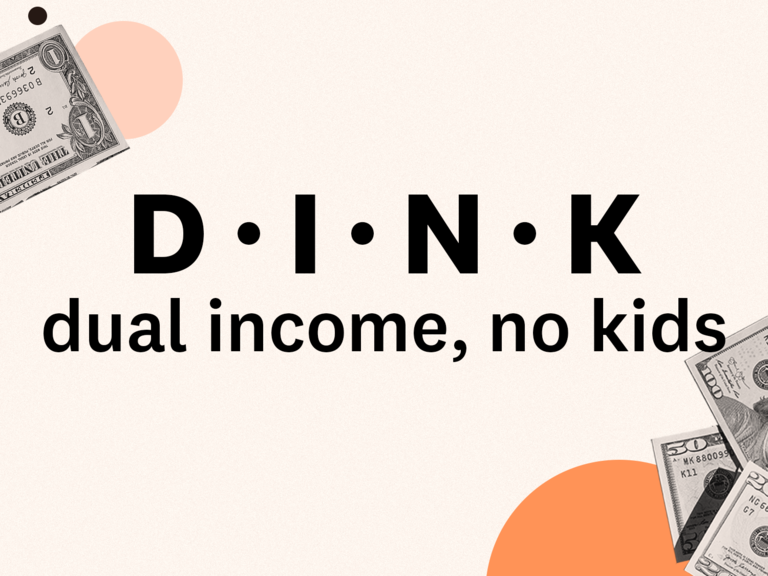What are DINKs and Why is DINK Era Trending Right Now?

These days, it seems like there's an acronym or a trendy term for just about everything—but there's one particular viral relationship buzzword that caught our eye. If you've spent any time on social media, you might have seen videos about DINKs, DINK couple, DINK era, or the DINK lifestyle. But what does DINK mean? No, it's not a bad word. In fact, it may indicate a lifestyle shift among young couples or a lifestage.
So, what's the definition of DINK? And what's a DINKWAD, or a DINKWAC? We called on experts—including real DINKs themselves—to share what you need to know, and why this buzzy DINK lifestyle is starting to take off.
What does DINK, DINKY and DINKWAD mean?

Perhaps you've seen a video of couples claiming "We're DINKs," or "In our DINK era," or maybe this is your first time seeing the word. The definition of DINK is quite simple: It's an acronym that stands for "dual income, no kids." In other words, DINK couples are two people who each have a stream of income and share no children. There are also plenty of subdivisions of DINKS: DINKWAH—"dual income, no kids with a house," DINKWAD stands for "dual income, no kids with a dog," DINKWAC stands for "dual income, no kids with a cat," and DINKWAP means—you guessed it—"dual income, no kids with a pet." And now we're seeing the trendy acronym DINKY—"dual income, no kids yet" and the hashtag #dinkera—opening the door for couples to have kids in the future.
Why the Terms DINK Lifestyle and DINK Era are Trending on TikTok
The concept of DINKs isn't necessarily new. The word itself can be traced back to the 1980s when "yuppie" culture hit a fever pitch. (At the time, "yuppie" was a popular slang term that stood for "young, urban professionals.") While the word's popularity and usage has fluctuated over the years, it regained some traction amid The Great Recession from 2007 to 2009. Some say the DINK lifestyle may have even inspired the name of Dinkytown, Minnesota, though its true origins are unconfirmed.
Now, the word is once again trending online. The hashtag #dink has almost 40,000 posts on TikTok, while the tag #dinks has just over 12,500 posts. Although it's hard to confirm exactly why the word DINK is being incorporated into everyday vernacular, it might be simply because it's short, catchy, and easy to say. "DINK is simple, fun, and accurate. The first time we heard it, after our shared laughing fit, we knew it was where we belonged," say Lu and Jas, a South Florida-based DINK couple behind the social media account @LesGetLucky. "TikTok, and social media in general, allow for quick thoughts, videos, sayings, words to spark conversation and alignment. It creates familiarity and helps to curate an identity."
Buzzy words aside, society has evolved to the point that not wanting kids has become more normalized than ever before. "While the dual-income-no-kids lifestyle may be currently trending, it isn't a foreign concept to many folks," explains Leanna Stockard, LMFT at LifeStance Health. "Having children isn't desirable for every person or couple out there. Young couples are likely beginning to embrace this lifestyle because society is favoring the individual more than ever, and younger generations are using this shift to grow before making lifelong commitments, like marriage and raising children. They are now focusing on understanding themselves, understanding their wants and needs, and not always following a timeline of what they 'should' be doing by a certain age."
The topic of children is also one that singles are starting to talk about in the early stages of relationships. In fact, some even broach the subject before the first date. "Family planning is an important topic for people on dating apps," says Michael Kaye, Director of Brand and Communications for OkCupid. "What's trending on platforms like Instagram and TikTok typically become conversation starters on dating apps. There was a 14.5% increase in mentions of DINK or related phrases (like 'don't want kids') on OkCupid profiles in January 2023 compared to December 2022."
For Alli and Caleb, a self-proclaimed DINK couple based in Idaho, social media provides a lens to see others pursuing this lifestyle, thus normalizing it. In fact, Alli, who manages The Knot's TikTok account, says social media helps propel the discourse just like other pop culture mediums. "Social media does a great job of showing couples in their 40s, 50s, 60s, and beyond, who never had kids, and are still living a successful life," she tells us. "For me, pop culture works like Sex in the City promoted [the ideals of] not having kids until later, or not having them at all… Now with TikTok and Instagram, you're actually seeing people who are living that lifestyle."
For some couples, the DINK lifestyle is a lifestage. In other words, the period when couples build their lives together first before having children. So as not to be left out of the social conversation, this has led to the growing popularity of hashtags like #dinky (dual income, no kids yet) and #dinkera on TikTok giving room to live the #dinklifestyle now and become DEWKs (dually employed with kids) in the future.
Why Couples Choose a Dual Income, No Kids (D.I.N.K.) Lifestyle
Being a DINK family has more perks than just its fun name. While the reasons for choosing to pursue the dual income, no kids lifestyle are incredibly personal, there are a few common themes among couples that we explore below.
Having Children Is Costly
Amid inflation challenges and talks of an impending recession, the cost of living is skyrocketing. In October 2022, the Social Security Administration announced that its 2023 cost-of-living adjustment, or COLA, would be 8.7%, the highest since 1981. Unsurprisingly, the cost of raising a child also continues to increase. According to a 2022 report from Brookings Institution, it costs around $310,000 to raise a child from birth to age 17. This number was derived from the Department of Agriculture's 2015 estimate for the cost of raising a child, and was fine-tuned using numbers to account for inflation since then.
Given these exorbitant fees, young couples are more cognizant of their ability to support a family based on their incomes—and some are making the choice to forgo children altogether. "We see more and more young couples delaying having children or deciding not to have children often due to the costs," says Rebecca A. Carter, partner with Friedman, Framme & Thrush P.A., a LegalShield provider law firm. "Children are expensive any way you slice it, including staggering childcare costs. In the DC/Baltimore area, for example, full-time childcare for an infant is nearly $2000/per month, after taxes. For many couples, that shock alone has them postponing a baby." Plus, she adds, the tax benefits of having a family don't always offset the unavoidable costs. "While having children does offset some tax liability via things like the child tax credit, I believe the overreaching costs of raising children far exceeds any tax credit."
It Allows Them to Travel Freely
If traveling the world is important to you and your partner, it may be easier done without children. When thinking about the DINK lifestyle and whether it might be right for you, consider your values. While some couples want to prioritize expanding their family, others may prefer to spend their time (and their money) exploring the world, living in different countries, and immersing themselves in global cultures. "We've talked about living abroad for a year, because we've never done that before and think it would be fun," Alli says. "Plus, not having kids means it's easier to own a small house and spend longer periods of time visiting family throughout the US."
It Provides Time for Other Hobbies
Perhaps one of the most enticing elements of being a DINK family is the ability to do whatever you want, whenever you want. "Not having children allows us to freely think about who we want to be as human beings through this journey in life, and explore that with flexibility and no babysitters," Lu and Jas say. "Remaining childfree has given us so much space to define our own freedom and create joy, while also being able to do that for our families." Plus, goals and life circumstances can change at any time, and not having kids provides the opportunity to change your trajectory at a moment's notice.
They Don't Want to Bring Up Children in the Current Climate
The current state of the world may also be a driving factor for couples to pursue the DINK lifestyle. Challenging crises like climate change, social injustice, and political strife may make couples think twice about having children. "I've heard from multiple people that they do not want to bring children into the world with the current state of our nation, that they don't want to place the same challenges they faced onto their children, or that they don't want to pass down multigenerational trauma onto their children," says Stockard.
Referencing two married, childless professors they learned from during their graduate studies, Caleb explains how he and Alli were inspired by their use of free time to volunteer, protest, and pursue activism. "When you have kids, you have something to care for, but there's also something to be said for the kindness you can do in the world when you don't have kids," he says. Adds Alli: "It really opens up your ability to care for the wide global community and the planet because you actually have the time."
It's Normalized Not Wanting Children
In years past, the concept of not having children would have been frowned upon, especially considering it was the expected norm for most, if not all, families. Now, thanks to pop culture influences, honest discourse fueled by social media platforms, and buzzy trends like the #DINKLifestyle movement, it's become more normalized than ever to forgo children.
Before they met, Alli and Caleb didn't see themselves having kids—and they say it was a "relief" when they discovered that they were on the same page. "I knew from a very young age that I didn't want to have kids, and that was one of the biggest subjects that we both agreed upon immediately, even when we were dating," she notes.
What Couples Can Expect from a DINK Lifestyle
Ultimately, the choice to live the DINK lifestyle is personal. What works for one couple may not work for another, and it's important to continually discuss the subject of children with your partner before getting married, and after. But those who are actively pursuing the DINK lifestyle say it's one that's full of autonomy and satisfaction. "I was born in the right generation because I can choose whether or not to have kids and I don't take that for granted," Alli reflects. "I see this awesome life for us where we get to travel, learn and be creative, and spend money for the purpose of spending time with our friends and family."
"We're in this DINK life forever," Jas says. "In a world with so much going on sociopolitically and with the freedom we've already experienced, this is our position of abundance. It is the autonomy that we desire for everyone else. It is our responsible choice. With a lot of thought and conversation, it's what works for us."























